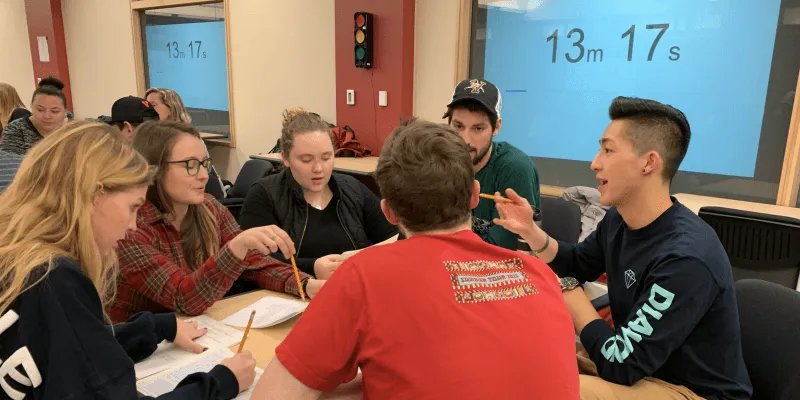Collaborating with professionals in diverse fields to solve complex problems is an important component of education in the health sciences. Health care providers share responsibility for team-based, holistic care of patients.
Learning these skills in her first year as a graduate student excites Kira Kamrud, DPT ’21, as she thinks about her future patients.
“The medical field is truly going in the direction of a collaborative approach to a patient’s plan of care, so the earlier we can start being comfortable in this type of setting, the better,” Kamrud said.
That’s the idea behind a new, graduate-level course for students pursuing degrees in physical therapy, nursing, communication sciences and disorders, biomedical and health sciences and nutrition. The course, NH 396/DPT 408 Fundamentals of Critical Inquiry, commenced spring semester 2019. Students learn from professors in their majors along with faculty from UVM Libraries and with support from the Graduate Writing Center. They will work together in interdisciplinary teams to develop research questions, search for evidence and critically appraise the evidence, and apply what they learn to their patients or clients.
Rehabilitation Science and Movement Professor Reuben Escorpizo and Nursing Professor Ellen Long-Middleton co-coordinate the course in collaboration with 12 colleagues in various academic departments, including library science, physical therapy, biomedical science, nursing, nutrition and communication sciences and disorders. They developed the course around the concept of “team science,” which engages people from various professions working together toward the resolution of complex problem, leveraging the strengths and expertise of professionals trained in different fields.
“The content of the course is secondary to learning the process of communicating interprofessionally. There is strong evidence that addressing a problem by working collaboratively contributes to better health outcomes,” Escorpizo explained. “It is always a challenge to deal with people from other disciplines. There are discipline-specific nuances, and team members may lack a common vocabulary and have different backgrounds and styles.”
Working in teams with students in various health care majors makes the class interactive and fun, said Karud.
“Getting out of our comfort zone of our own, major-specific classes and interacting with other students with a similar goal but different approach will be crucial to our knowledge,” Kamrud said. “My hope is to grow my knowledge of research and evidence-based practice and learn more about my future colleagues.”
Nursing Instructor and graduate student Teresa Cahill-Griffin, DNP ’22, enjoys this new class as she pursues her Doctor of Nursing Practice degree. She finds the coursework helpful to her teaching and practice. “The collaborative spirit guides discussion in the small groups and we all seem interested in learning from each other. I feel that my work as an RN at the bedside as will be enhanced because of the improved relationships with fellow team members and an increased ability to work through issues utilizing a team approach.”
